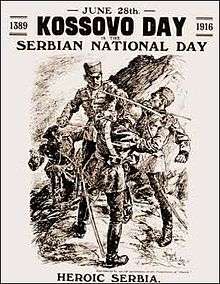Serbophilia

French poster from WWI
A Serbophile is a person who has a strong positive predisposition or interest toward the government, culture, history, or people of Serbia. This could include Serbia itself and its history, the Serbian language, Serbian cuisine, literature, etc. The opposite of a Serbophile is a Serbophobe – who has a strong negative predisposition toward or dislike of the government, culture, history or people of Serbia.
Historically, Serbophilia has been associated with supporters of the history of Serbian Empire and Serbian Monarchy.
Serbophiles
- Johann Wolfgang von Goethe — famous German writer, poet, scientist, artist and politician.[1]
- Jacob Grimm — German philologist, jurist and mythologist. Learnt Serbian in order to read Serbian epic poetry.[2]
- Archibald Reiss — Swiss publicist, chemist, forensic scientist, a professor at the University of Lausanne.[3]
- Rebecca West (1892–1983) — English travel writer. Was described by American media as having a pro-Serbian stance.[4]
- Flora Sandes — British volunteer in World War I.
- Ruth Mitchell — American volunteer in the Chetniks, World War II. Sister of Billy Mitchell.
- Peter Handke — Austrian novelist and playwright. Supported Serbia in the Yugoslav Wars.[5]
- Essad Pasha Toptani — Ottoman politician.[6]
- Henry Bax-Ironside — British diplomat.[7]
- Roland Bryce — British diplomat.[8]
Gallery
-

"The Chain of Friendship", a comic published in the American newspaper the Brooklyn Eagle in July 1914
-

Departure for Serbia
-

-

See also
References
- ↑ http://www.gmbooks.com/product/SerbMusicGM.html
- ↑ Donald Haase (2008). The Greenwood Encyclopedia of Folktales and Fairy Tales: G-P. Greenwood Publishing Group. pp. 531–. ISBN 978-0-313-33443-6.
- ↑ http://www.skss.ch/index.php?option=com_content&view=article&id=107:pouke-arcibalda-rajsa&catid=50:ch-sr&lang=de
- ↑ Victoria Glendinning (1988). Rebecca West: A Life. Fawcett Columbine. p. 176. ISBN 978-0-449-90320-9.
- ↑ K. Stuart Parkes (January 2009). Writers and Politics in Germany, 1945-2008. Camden House. pp. 174–. ISBN 978-1-57113-401-1.
- ↑ The Ottman Empire and Its Successors, 1801 -1927. CUP Archive. pp. 529–. GGKEY:5L37WGKCT4N.
- ↑ Hidryma Meletōn Chersonēsou tou Haimou. Hidryma Meletōn Chersonēsou tou Haimou. 1971.
- ↑ Lojkó Miklós; University of London. School of Slavonic and East European Studies (1995). British policy on Hungary, 1918-1919: a documentary sourcebook. School of Slavonic and East European Studies. p. 126. ISBN 978-0-903425-39-1.
Sources
- Sells, David (1997). Serb 'Demons' Strike Back (Royal Institute of International Affairs) Vol. 53, No. 2
External links
 The dictionary definition of serbophilia at Wiktionary
The dictionary definition of serbophilia at Wiktionary
This article is issued from Wikipedia - version of the 10/6/2016. The text is available under the Creative Commons Attribution/Share Alike but additional terms may apply for the media files.